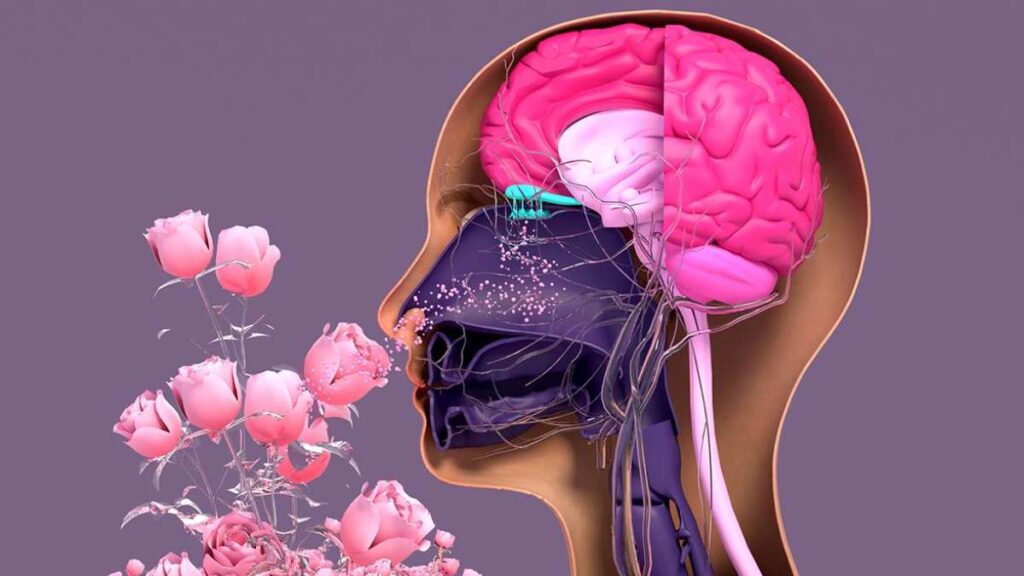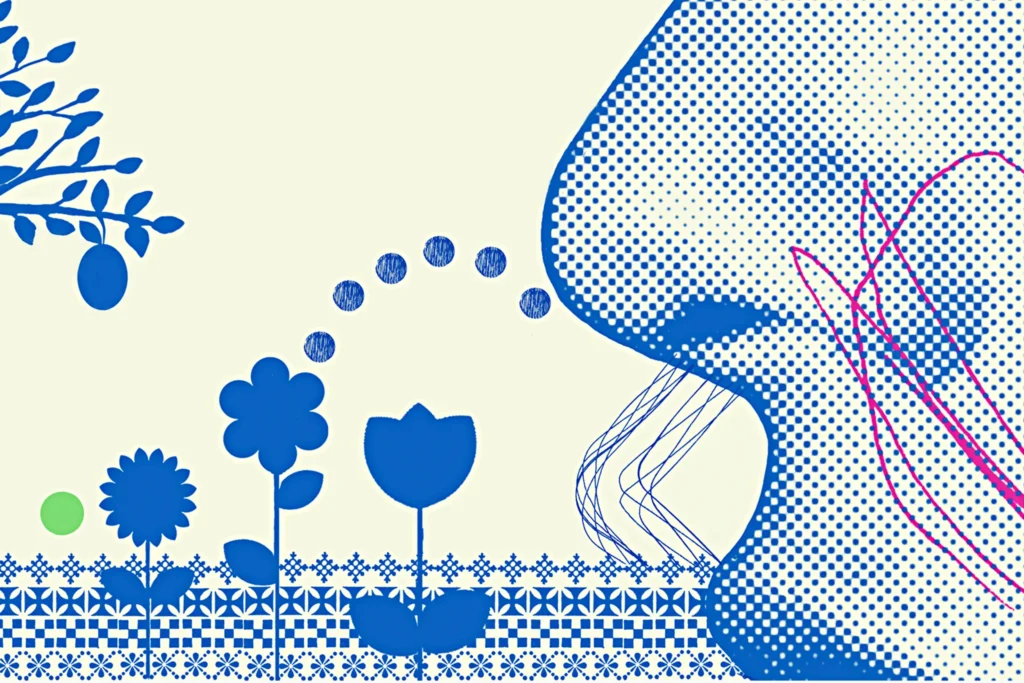Do you remember ever catching a whiff of some scent and instantly being transported to a particular moment in your life? It might have been the smell of grandma’s baking, or the salty sea air of a beach vacation, or maybe the cologne of a loved one. How stuff of legend is the power of fragrance in leading to feelings and stirring emotions—long before we uncover its scientific grounds.
The sense of smell is more than just a sensory experience; it’s a key to unlocking emotions, shaping moods, and triggering memories. Let’s explore the fascinating world of olfactory science and uncover how fragrances influence our mental and emotional well-being.

Before diving into the emotional connections, it’s important to understand how smell works.
The Olfactory System
When you breathe in, odor molecules enter your nose and bind to receptors in the olfactory bulb, located at the top of the nasal cavity. This is the only sense directly connected to the brain’s limbic system, which governs emotions, behavior, and memory.
A Direct Path to Emotion
Unlike sight or sound, which passes through multiple brain areas before being processed, smell has a direct line to the amygdala and hippocampus—the brain’s emotional and memory centers. This unique wiring explains why smells can evoke such strong, immediate responses.
Fragrance and Mood: The Science

Fragrance has the incredible ability to affect how we feel, from lifting spirits to calming nerves. Here’s how:
- The Power of Aromatherapy
Aromatherapy refers to the medicinal use of aromatic oils in healing processes with the objective of improving physical and mental conditions. Scientific experiments reveal that the different smells impact the functioning of the brain, hence triggering mood changes.
Lavender: It calms; it diminishes anxiety levels while enhancing a resting state
Citrus: A lemon, orange, among other citrus aromas, is rejuvenating and raises energy and concentration.
Vanilla: Vanilla makes one feel cozy and warm and has proven to reduce tension. 2. Reduces stress and relaxes
Ever notice how the smell of a spa can instantly relax you? That’s no accident. Scents like chamomile, ylang-ylang, and sandalwood are proven to reduce cortisol levels (the stress hormone), helping to create a sense of calm. - Boosting Productivity and Focus
Some fragrances, such as rosemary and peppermint, have cognitive-enhancing properties. They stimulate the mind, improve concentration, and even enhance memory retention. - Enhancing Happiness
Floral fragrances such as rose and jasmine are mood enhancers, often found in perfumes and candles, that evoke a feeling of happiness and positivity.
The Link Between Smell and Memory
The association between smell and memory is one of the most fascinating aspects of olfactory science.
- The Proust Phenomenon
Named after author Marcel Proust, this phenomenon describes how a specific scent can trigger vivid, emotional memories. For example, the smell of freshly baked cookies might remind you of your childhood home. - Why Smells Trigger Strong Memories
Direct connections of the olfactory bulb with the hippocampus (memory) is why smells recall memories more vividly than any other sense. Most of the time, memories connected to such strong emotions make them very potent. - Creating Positive Associations
Brands and marketers often use this connection to their advantage. Think of how hotels and retail stores use signature scents to create memorable experiences. You might not remember the furniture in a store, but the scent of their space will linger in your mind.
Using Fragrance to Shape Your Mood and Memory

Harnessing the power of fragrance in your daily life can be transformational. Here’s how you can make scents work for you:
- Create a Signature Scent
Selecting a personal fragrance that speaks to you can increase your confidence and become part of your identity. It’s also a way to leave a lasting impression on others. - Set the Mood in Your Space
Candles, diffusers, and incense can become great ingredients for setting up an atmosphere in your living space. Apply:
Lavender or chamomile in your bedroom for relaxing feelings.
Citrus or peppermint at the workspace for energizing feelings. - Fragrance as Self-Care
Add your choice of essential oils to your bath or skincare time. The process of enjoying a nice scent can turn mundane acts into an act of self-care. - Memory Keeper
Use fragrance with purpose during special occasions, such as weddings or vacations. The same fragrance can later serve as a time capsule that transports you back to those fond times.
Cultural Views on Smell
The relationship between smell, mood, and memory is not only scientific but also cultural. For thousands of years, various cultures have understood the potency of smell.
Ancient Cultures
The Egyptians used frankincense and myrrh in rituals, believing that scents could connect them to the divine.
This aroma was used as a cultural religion ritual in India by way of mediation and ceremony that create sacred moods.
Recent Past
Today in Japan, the traditional practice, Kōdō, or incense appreciation, uses a harmonizing practice with scents in meditation.
In the Middle East, both oud and bakhoor contribute to everyday practice, creating an expression of hospitality or tradition.
Use of Fragrance for Mental Well-Being
Use of fragrant therapies for health-related applications has started gaining relevance.
- Anxiety and Depression Relief
Bergamot and neroli have been known to reduce symptoms of anxiety and depression. Aromatherapy is now used in some clinical settings to complement traditional treatments. - Sleep Quality Improvement
Lavender and chamomile are staples for those who have insomnia. They calm the mind, signaling to the body that it’s time to wind down. - Memory Support for Dementia Patients
Fragrance therapy is a new method for helping patients with dementia remember memories and elevate mood. Comfort and recognition are sometimes triggered by familiar scents from their past.
The Future of Fragrance and Neuroscience

possible applications of fragrance are vast and varied:
Personalized Scents
AI-driven technology is now being used to create fragrances tailored to an individual’s preferences and emotional needs.
Fragrance in Virtual Reality
Developers are adding the sense of smell to VR environments to make these experiences more intimate and emotionally effective.
Clinical Uses
Researchers have discovered that certain odors can treat PTSD, promote concentration, and even improve an athlete’s ability to perform.
Fragrance is not about smelling good but feeling good, creating memories, and helping shape your emotional landscape. Scents have such a deep influence on our lives, sometimes unknowingly. Fragrances can soothe nerves, kindle joy, or even make someone feel at home.
The next time you spritz on your favorite perfume or light a scented candle, take a moment to appreciate its power. That bottle on your dresser isn’t just a luxury item; it’s a tool for connection, transformation, and well-being.
Go ahead and explore the world of fragrance and find the scents that make your mood brighter, your days calmer, and your memories richer.
